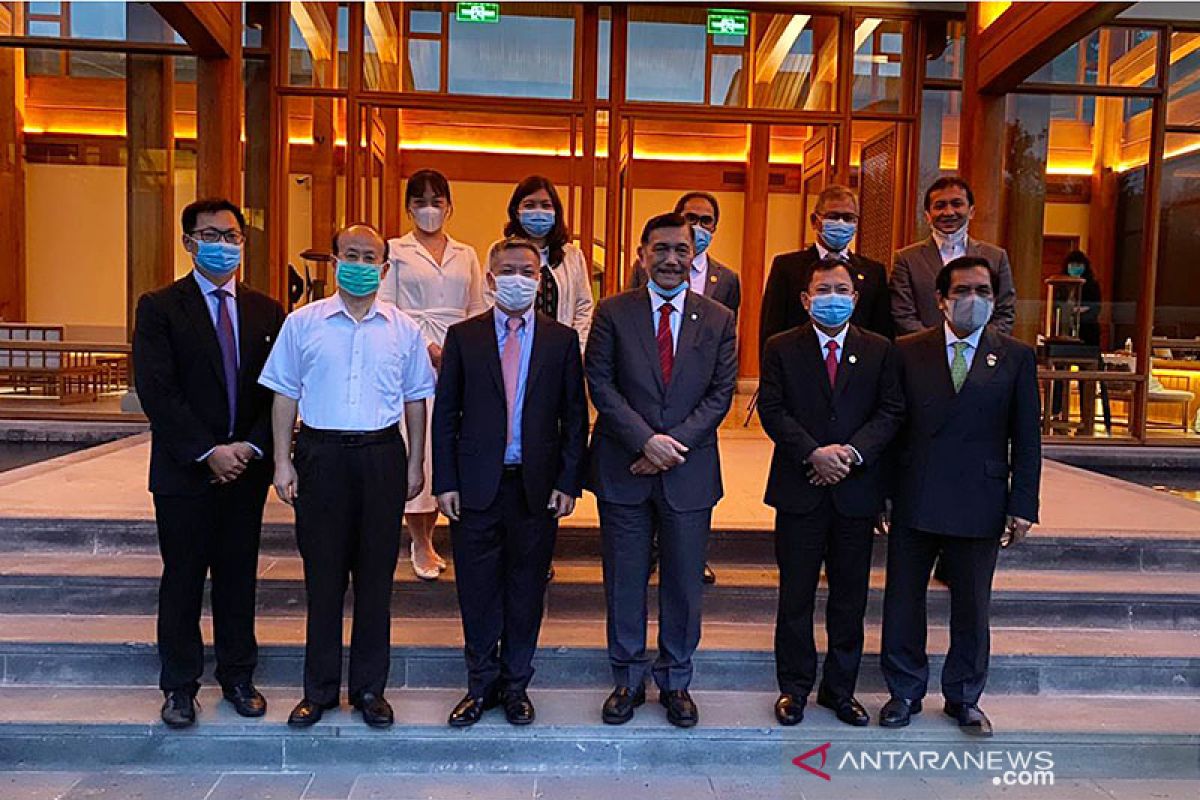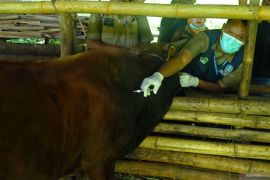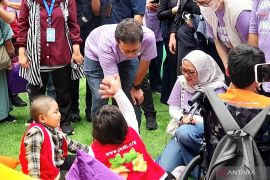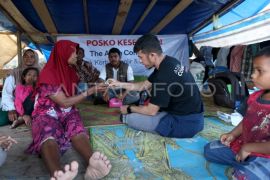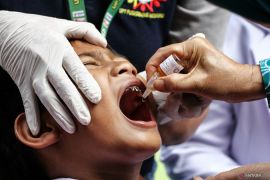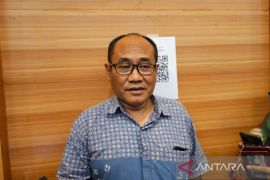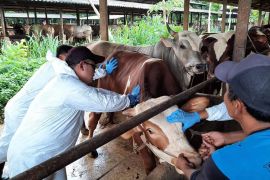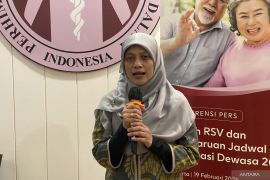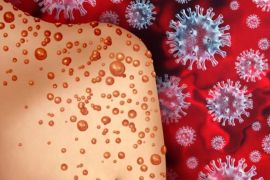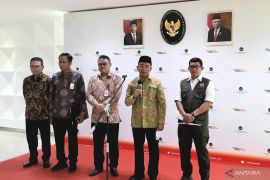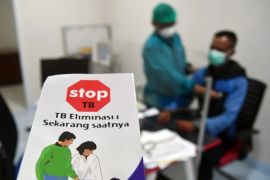Over the past few months, the government has made all-out efforts to secure the procurement and supply of potential COVID-19 vaccines for Indonesians through a bilateral and multilateral cooperation scheme.
The government is also supporting research efforts for developing the country's own COVID-19 vaccine, named after the colors of the national flag, Merah Putih(Red and White).
The economic contraction of 5.32 percent in the second quarter of this year has further highlighted the need for a COVID-19 vaccine to win the fight against the disease.
The availability of the COVID-19 vaccine by early 2021 may help Indonesia's economy to recover at the latest by mid-2021, Iman Sugema, a senior economist with the Institute for Development of Economics and Finance (Indef), has projected.
Indonesia has so far cooperated with China, and is exploring bilateral cooperation with the United Kingdom and Switzerland for COVID-19 vaccine procurement and supply.
President Joko Widodo has even signed a regulation specifying the procurement and immunization schedule for the COVID-19 vaccine for Indonesia.
According to the draft of the Presidential Regulation No. 99/2020 on COVID-19 Vaccine Procurement and Vaccination for Handling COVID-19 Pandemic, signed on October 5, 2020, Indonesia will carry out vaccine procurement and immunization in 2020, 2021, and 2022.
Under the regulation, the Committee for Handling the COVID-19 Pandemic and National Economic Recovery will be able to extend the immunization window by referring to the Health Ministry.
According to Article 2 Point 6 of the new regulation, the government will prioritize the procurement of the vaccine from Indonesia, while Article 5 Point 1 of the regulation states that state pharmaceutical holding company PT Bio Farma has been tasked with procuring the vaccine.
PT Bio Farma is expected to rope in its sister companies -- PT Kimia Farma Tbk and PT Indonesia Farma Tbk — to carry out its task.
Meanwhile, under the regulation, international agencies and bodies that can be invited to participate in bidding or research, production, or COVID-19 vaccine procurement include the Coalition for Epidemic Preparedness Innovations (CEPI) and the Global Alliance for Vaccines and Immunizations (GAVI), among others.
The newly-signed regulation also stipulates that the Health Ministry would determine the selling prices of the COVID-19 vaccine by taking the emergency situation and limited stocks of the vaccine into account.
The government has estimated that COVID-19 vaccines will be available in Indonesia by November, 2020.
The vaccines were secured during a meeting between the Indonesian delegation and the representatives of Cansino, G42, Sinopharm, and Sinovac in China on October 10 this year.
The vaccine doses pledged by the partnering pharmaceutical companies will vary, based on their production capacity and commitment to other buyers, according to a statement received by ANTARA.
Cansino has vowed to supply 100 thousand single doses of the vaccine in November, 2020 and about 15-20 million doses in 2021, while G42 and Sinopharm have pledged to supply 15 million double doses of the vaccine this year, of which, five million are expected to be provided in November this year.
Meanwhile, Sinovac has pledged to supply three million single doses of the COVID-19 vaccine by the end of December, 2020. Additionally, it has promised to provide 15 million doses in bulk.
Of the three million Sinovac doses, 1.5 million will be made available in the first week of November, while the rest will be supplied in the first week of December this year.
Sinopharm has vowed to supply 50 million double doses of the COVID-19 vaccine in 2021, while Cansino and Sinovac have pledged to provide 20 million single doses and 125 million double doses, respectively.
To ensure that there will be a sufficient supply of vaccines for the entire nation, the Indonesian government is also trying to expand cooperation with overseas partners.
Foreign Minister Retno Marsudi, State-Owned Enterprises (SOEs) Minister Erick Thohir, and Health Ministry's team members are currently visiting the United Kingdom and Switzerland to explore potential cooperation in COVID-19 vaccine procurement and supply.
The main objective behind the official visit includes securing the commitment of other sources to boost bilateral cooperation in obtaining COVID-19 vaccine supplies, Marsudi said at an online press conference.
During the visit, the Indonesian delegates are scheduled to meet with the director general of the United Nations' World Health Organization (WHO) and representatives of the GAVI Alliance and CEPI.
Related news: President signs regulation on COVID-19 vaccine procurement
Related news: Jokowi urges government officials to prepare COVID-19 vaccination plan
They will discuss matters related to the COVAX Initiative through which the GAVI Alliance is coordinating COVID-19 vaccine procurement and supply, she noted adding, CEPI is monitoring the research and development of potential COVID-19 vaccine products.
Under the COVAX Initiative, once COVID-19 vaccines are available, they will be procured through the UNICEF Supply Division.
Under the cooperation scheme, the UNICEF has been mandated to coordinate the procurement and supply of the COVID-19 vaccine for more than 140 countries, including Indonesia, to enable each country to have equal access and outreach to the vaccine.
The Indonesian delegation's visit to the UK and Switzerland is also expected to boost mid- and long-term cooperation between state pharmaceutical holding company PT Bio Farma and its overseas partners, Marsudi stated.
As soon as the COVID-19 vaccine is available, the government plans to conduct COVID-19 immunization programs across Indonesia.
The Health Ministry has readied a COVID-19 vaccination program, and to this end, it has adopted requisite measures, including ensuring the preparedness of health facilities and simulation at public health centers in the country.
Since the end of September, 2020, health workers have also received training on the COVID-19 vaccination's standard operating procedures, according to Health Minister Terawan Agus Putranto.
He has emphasized that in the early phase, the vaccines will be administered to those on the frontlines of the battle against COVID-19, including medical workers and paramedics, military and police personnel, teaching staff, and those involved in providing public services.
The government will extend assistance to all those on the frontlines who are financially incapable and registered for contribution assistance (PBI) with the Healthcare and Social Security Agency (BPJS Kesehatan) by covering their vaccine costs, Putranto informed.
Looking at its efforts to obtain the COVID-19 vaccine from overseas, the Indonesian government has undoubtedly shown its commitment to saving the lives of its people, and, at the same time, reviving the country's economy.
The people, on their part, need to keep in mind that even without the COVID-19 vaccine, several countries, including Vietnam and New Zealand, have managed to successfully minimize the transmission of the deadly virus.
Unlike Indonesia, which seems to have adopted a lenient approach in addressing COVID-19 cases, from the early stages of the coronavirus outbreak, the governments of countries who have successfully curbed COVID-19 transmission have seriously and consistently imposed strict health protocols, and practiced precautionary measures.
Indonesians must learn from the successful nations and follow the preventive measures mandated by the government’s health protocols so that another potential outbreak can be contained, even though immunization will be carried out, sooner or later.
Related news: Indonesia explores COVID-19 vaccine cooperation with UK, Switzerland
Related news: Indonesia secures vaccine supply for 135 million people until 2021
Editor: Gusti Nur Cahya Aryani
Copyright © ANTARA 2020
